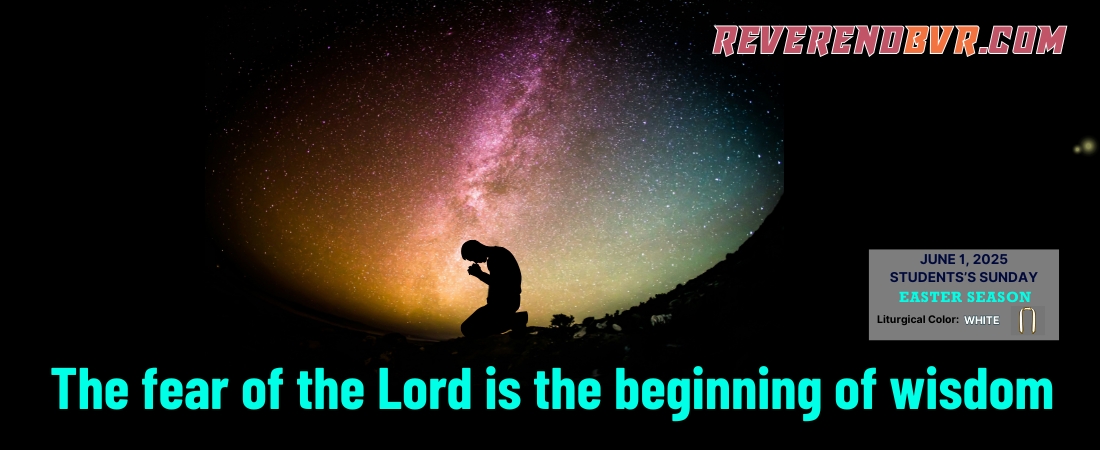On this Student Sunday, “Fear of the Lord is the Beginning of Wisdom” calls learners and leaders alike to rediscover reverent awe as the foundation of true understanding—where discernment, humility, and grace replace the illusions of self-made knowledge. Drawing from 1 Kings, Psalms, 1 John, and Luke, this sermon challenges us to seek not just academic success, but godly wisdom that transforms hearts, communities, and futures.
Sermon Title: Fear of the Lord is the Beginning of Wisdom | Date: June 1, 2025
Occasion: Student Sunday | June 1, 2025, Sunday | Textual Foundations: 1 Kings 3:24–27; Psalm 14; 1 John 5:13–21; Luke 10:21–24
Original Language Reflections: For deeper study, refer to the Table of Hebrew and Greek Terms in Section 9 of the sermon.
Website: www.reverendbvr.com
Introduction: In the name of the Father, and of the Son, and of the Holy Spirit. Amen.
In an age saturated with information yet bereft of meaning, we are surrounded by what Nietzsche called “the death of God” — not simply disbelief, but the collapse of meaning in a secularized world. We are told to trust in human autonomy, in unbounded reason, and in progress without transcendence. But Scripture reminds us: “The fear of the Lord is the beginning of wisdom” (Proverbs 9:10).
On this Student Sunday, We confront a paradox: knowledge divorced from reverence leads not to wisdom but to fragmentation. The lectionary texts do not merely call us to think—they call us to worship, to live in awe before a God whose wisdom both transcends and redeems our human striving.
Theologically, “the fear of the Lord” is not terror but the epistemological starting point of wisdom — a posture of awe toward God’s holiness, transcendence, and grace. True wisdom is not autonomous discovery, but divine revelation received in humility.
Let us now walk through the sacred texts with minds alert and hearts open.
1. The Wisdom of Discernment: (1 Kings 3:24–27)
The famous judgment of Solomon presents a masterclass in godly wisdom. Solomon’s request for a “listening heart” (Hebrew: lev shomea, 1 Kings 3:9) rather than wealth or victory signals that true leadership begins in humility before God. The sword in Solomon’s command is not a weapon of destruction, but a tool of revelation—it reveals the true mother by provoking an act of selfless love.
Historical Context: In ancient Israel, kings were expected not merely to govern but to represent divine justice. Solomon’s wisdom becomes the litmus test of his kingship. This narrative invites students and seekers today to pursue knowledge not for self-exaltation, but for service rooted in ethical clarity and compassion.
2. The Folly of Godlessness: (Psalm 14)
Psalm 14 presents a stark contrast to Solomon’s wisdom: the fool says in his heart, “There is no God.” Here, the fool (nabal in Hebrew) is not intellectually deficient, but morally rebellious. The rejection of God leads to societal decay, injustice, and spiritual blindness.
Relevance to Students: In academic contexts where secularism can subtly dismiss the divine, Psalm 14 calls us back to a moral compass. Wisdom for the student is not just mental prowess, but integrity, justice, and reverence for God. The Lord seeks those who understand and seek after Him (v.2).
3. Confidence, Discernment, and Sin: (1 John 5:13–21)
John’s epistle gives students the assurance that belief in Christ is not a suspension of intellect but its fulfillment. The knowledge of eternal life and the confidence in prayer (vv.13–15) flow from relational intimacy with Christ. Verse 20 is especially powerful: “The Son of God has come and has given us understanding…”
Understanding Sin and Intercession: Verses 16–17 introduce a nuanced concept: “sin that does not lead to death” and “sin that leads to death.” This distinction is deeply rooted in early Christian ethics and Johannine theology.
- The ‘sin not leading to death’ refers to moral failings or lapses within the believer’s journey—sins which, when confessed and repented of, are forgiven (cf. 1 John 1:9).
- The ‘sin leading to death’ is more complex and has been classically understood to include:
- Blasphemy against the Holy Spirit (cf. Matthew 12:31–32): Attributing God’s work to evil, resulting in hardened resistance to grace.
- Apostasy (cf. Hebrews 6:4–6; 10:26–31): A total and willful rejection of Christ after knowing the truth.
- Persistent hatred (cf. 1 John 3:14–15): A rejection of love and the community of believers.
Church Fathers like Augustine and Origen observed that such sin reflects a settled resistance against divine truth, where the heart becomes impervious to repentance. John’s comment, “I do not say that you should pray for that,” does not forbid prayer, but acknowledges that such hardened rebellion can only be healed by divine mercy.
Academic Reflection: At secular institutions where moral pluralism and philosophical skepticism challenge traditional theology, this passage invites rich ethical reflection. The distinction John makes is not merely legalistic but pastoral. It compels the Church to intercede for the weak, warn the willfully rebellious, and trust in God’s ultimate judgment.
Spiritual Insight: The fear of the Lord is not terror but awe that leads to understanding. In a digital age of moral relativism, students are called to anchor their lives in the revealed truth of Christ. Wisdom is knowing the true God and living out that knowledge in a fallen world.
4. Divine Wisdom Hidden and Revealed: (Luke 10:21–24)
Jesus’ prayer in Luke 10 is one of joy and revelation. God hides wisdom from the proud and reveals it to the humble, to “little children.” -is both doxology and critique. Here, epistemology is reversed. Those who presume knowledge miss it. Those who are humble receive it. In Christ, revelation is relational. We see here a Trinitarian interplay of joy, knowledge, and mission.
Application: As students navigate pressures of performance and prestige, Jesus invites them into a counter-cultural posture: humility and trust. Those who see with the eyes of faith are more blessed than the prophets and kings of old (v.24).
5. Living Wisely in a Complex World
Students today face immense pressures—academic burnout, ethical dilemmas, career anxieties, and a culture of comparison. What can we offer them?
- A Wisdom that Discerns: Like Solomon, they need spiritual discernment to navigate ambiguity.
- A Wisdom that Endures: Like the Psalmist, they must resist the fleeting wisdom of the age.
- A Wisdom that Assures: Like John, they must be grounded in the assurance of truth and eternal life.
- A Wisdom that Receives: Like Jesus’ disciples, they must learn to be humble, receptive, and joyful in truth.
6. Biblical Wisdom and Practical Encouragements for Students
| S.No | Challenge | Scripture | Biblical Insight | Life Application for Students |
| 1 | Academic Pressure | 1 Kings 3:9, 24–27 | Solomon asks for discernment to govern rightly—wisdom is for service and justice. | Ask for wisdom, not just grades. Seek to discern truth in love and serve others. |
| 2 | Moral Confusion | Psalm 14 | Without God, moral clarity erodes—fools ignore the divine foundation of ethics. | Seek God’s perspective in ethical decisions. Avoid pride that excludes God. |
| 3 | Sin and Failure | 1 John 5:13–21 | Recognize the seriousness of sin and the call to intercede for others. | Repent sincerely. Pray for others. God is faithful and just to forgive. |
| 4 | Doubts about Faith | Luke 10:21–24 | Jesus rejoices in revealing truth to the humble and childlike in spirit. | Come with a teachable heart. Let wonder and trust lead your faith journey. |
| 5 | Career and Calling | Proverbs 3:5–6 | Trusting God leads to a clear path and meaningful direction. | Don’t lean on your own understanding—surrender your ambitions to God’s guidance. |
| 6 | Confidence in Truth | 1 John 5:13–21 | Believers are called to know the truth and be assured in eternal life. | Let your faith shape your identity and give you boldness in academics and life. |
| 7 | Humility and Revelation | Luke 10:21–24 | God reveals truths to the humble, not to the self-assured or prideful. | Stay humble in your studies—spiritual understanding comes through dependence. |
7. Conclusion
In a world that often idolizes achievement and intellect, Scripture reminds us: the foundation of all true learning is the fear of the Lord. This fear is not one of dread but of awe, reverence, and trust. To be wise is to be aligned with God’s heart. As students, educators, and spiritual seekers, let us cultivate not just minds filled with facts, but hearts attuned to the voice of God.
Let us teach our students not merely to pass exams, but to discern spirits (1 John 4:1); not only to earn degrees, but to cultivate virtue; not just to find careers, but to answer callings.
8. Closing Prayer
Gracious and Almighty God,
We thank You for being the source of all wisdom. As we honor our students today, we pray that You would fill them with a deep and holy fear—not of failure or the future—but of You, in awe and reverence. Help them to walk humbly, learn eagerly, and serve faithfully. May their pursuit of knowledge be grounded in truth, led by Your Spirit, and anchored in Christ.
We ask this in the name of Jesus, who is our wisdom, our teacher, and our guide.
Amen.
9. Learn Words from the Original Scriptures (For deeper understanding and meditation on today’s theme)
| S.No | Term – Click on each term to view its lexical details | Language | Meaning/Context in Sermon |
| 1 | לֵב שֹׁמֵעַ (lev shomea) | Hebrew | “A listening heart” — Solomon’s request for wisdom in 1 Kings 3:9. |
| 2 | נָבָל (nabal) | Hebrew | “Fool” — In Psalm 14, not intellectually deficient but morally corrupt. |
| 3 | φόβος Κυρίου (phobos Kyriou) | Greek | “Fear of the Lord” — Reverent awe that leads to wisdom (referenced from Proverbs 9:10). |
| 4 | ἀποκάλυψις (apokalypsis) | Greek | “Revelation” — As in Luke 10:21, wisdom revealed to the humble. |
| 5 | διάκρισις (diakrisis) | Greek | “Discernment” — Related to the spiritual gift of distinguishing truths (applied conceptually). |
| 6 | αἰώνιος ζωή (aionios zoe) | Greek | “Eternal life” — Assurance of divine truth and identity in 1 John 5:13. |
10. Summary Table
| S.NO | Scripture | Key Insight | Application for Students |
| 1 | 1 Kings 3:24–27 | Discernment born of reverent prayer | Seek wisdom through godly humility |
| 2 | Psalm 14 | Folly of rejecting God | Integrate faith with learning |
| 3 | 1 John 5:13–21 | Assurance and understanding in Christ | Ground your identity in divine truth |
| 4 | Luke 10:21–24 | Revelation to the humble | Approach learning with childlike dependence |
11. Bibliography
- Alter, Robert. The Wisdom Books: Job, Proverbs, and Ecclesiastes. New York: W.W. Norton & Company, 2010.
- Brueggemann, Walter. The Message of the Psalms. Minneapolis: Augsburg Fortress, 1984.
- Childs, Brevard S. Old Testament Theology in a Canonical Context. Philadelphia: Fortress Press, 1985.
- Wright, N.T. The New Testament and the People of God. Minneapolis: Fortress Press, 1992.
- Wenham, Gordon. The Psalms as Torah: Reading Biblical Song Ethically. Grand Rapids: Baker Academic, 2012.
- Kruse, Colin G. The Letters of John. Grand Rapids: Eerdmans, 2000.
- Hurtado, Larry W. Lord Jesus Christ: Devotion to Jesus in Earliest Christianity. Grand Rapids: Eerdmans, 2003.
- Augustine of Hippo. Confessions and On the Trinity.
- Origen. Commentary on the Gospel of John.
© 2025 ReverendBVR.com | High-Academic Sermon Series, 2025.
Content licensed under Creative Commons Attribution-NonCommercial-NoDerivatives 4.0 International (CC BY-NC-ND 4.0). You are free to share — copy and redistribute the material in any medium or format with proper attribution. No commercial use or modifications allowed without explicit permission.
For further sermons and biblical reflections, please visit 🌐 www.reverendbvr.com/sermons

